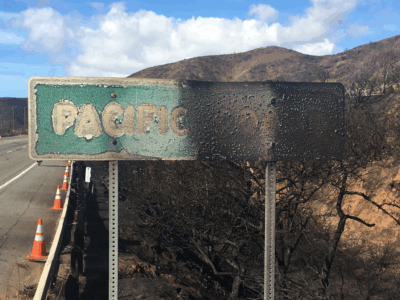SAFE From Kavanaugh?
Would the newest Justice uphold the Trump administration’s fuel economy standards rollback?
A little over a week ago, my colleagues and I submitted comments to EPA and NHTSA urging the withdrawal of the Trump administration’s so-called “SAFE” rule, which would roll back the federal fuel economy standards for model year 2021-2026 passenger cars and light trucks and revoke California’s waiver for its Advanced Clean Cars program. The Advanced Clean Cars program, among other things, includes California’s zero-emission vehicle (ZEV) mandate. The ZEV mandate is a critical part of California’s, and other states’, compliance strategy to meet federal ambient air quality standards for conventional pollutants, like ozone.
The comment period on the proposed SAFE rule closed mere weeks after Justice Kavanaugh was confirmed to the Supreme Court, and it will be a long time before litigation over the rule could wind its way to the Court. Nonetheless, in the weeks since Kavanaugh’s confirmation, I’ve been thinking about how his appointment to the Court could impact a future decision on the rule.
I’ll start by saying that it’s difficult to predict whether and how Kavanaugh’s positions may change now that he’s on the Supreme Court, and so reading the tea leaves based on the stances he took while sitting on the D.C. Circuit is bound to be a very imprecise exercise. However, looking at his past environmental law decisions does provide some food for thought.
Much has been said about Kavanaugh’s unwillingness to read agency authority into a statute when he perceives the statute to lack a clear directive to the agency. Some have pointed to his reasoning on this front as potentially problematic for environmental regulation, and in particular, climate change regulation. Indeed, Kavanaugh has suggested more than once that he believes climate change regulation is an area for Congressional action and that he himself would not have found authority under the Clean Air Act to apply certain regulatory programs to GHG emissions.
But in the case of the SAFE rule, this sensitivity to administrative overreach would, I hope, give Justice Kavanaugh some pause. For example, in the waiver context, EPA has asserted an authority that doesn’t exist in the statute and is contrary to the legislative history: it’s saying it has the right to revoke a waiver, which it has never done, and which both the statute and legislative history suggest it can’t do. In the past, Kavanaugh has had much to say about agencies looking past the authority delegated to them by Congress. In his view, “[t]he plain meaning of the text controls; courts should not strain to find ambiguity in clarity; courts must ensure that agencies comply with the plain statutory text and not bypass Chevron step 1.” He has even quoted Justice Frankfurter’s famous admonition to “(1) Read the statute; (2) read the statute; (3) read the statute!” The waiver provision of the Clean Air Act, section 209, says nothing about waiver revocation, and the plain language of the statute is clear that EPA is to consider what Kavanaugh himself has called “a narrowly defined set of statutory criteria” only prior to, not after, determining whether a waiver should be granted. Where, as here, the statute isn’t ambiguous, the Kavanaugh of the past would, it appears, think long and hard about accepting a creative agency interpretation that relies on one piece of superseded legislative history to read authority into the statute.
Kavanaugh has also focused, in the past, on our federalism-based system of air pollution control, arguing that states play an important part in achieving pollution control. For example, in EME Homer City Generation, Kavanaugh recognized that “Congress set up a federalism-based system of air pollution control. Under this cooperative federalism approach, both the Federal Government and the States play significant roles.” EME Homer City Generation was a case about the federal government stepping in to regulate pollution before states could modify their state implementation plans to attempt to achieve certain reductions, so the context was different, but the principle that states have a distinct role in implementing air pollution controls is an important one in the context of the waiver, especially because of a potential revocation’s impact on the ZEV mandate and the ability of multiple states to meet ambient air quality standards.
In fact, Kavanaugh has even acknowledged California’s unique role in the context of section 209 waivers. In American Trucking Association v. EPA, a case that considered a section 209 waiver for truck transportation refrigeration units, Kavanaugh recognized that the Clean Air Act specifically gives California the ability to regulate mobile source emissions, and that EPA is provided only limited review of those standards. Kavanaugh himself wrote the opinion that upheld EPA’s waiver grant in American Trucking Association, explaining that under section 209, “EPA’s only role is to review California’s proposed rules under a narrowly defined set of statutory criteria.” The trucking industry argued that EPA had improperly granted California a waiver, but Kavanaugh disagreed. He noted that “[t]he expansive statutory language gives California…a good deal of flexibility in assessing California’s regulatory needs.” Finding that EPA was owed deference, Kavanaugh concluded that its rationale for granting the waiver was substantiated, not arbitrary or capricious.
Of course, a future assessment of the SAFE rule’s waiver revocation would implicate different circumstances: while the EPA did initially grant California a waiver for the Advanced Clean Cars program, the agency is now arguing that changed circumstances require the waiver to be revoked. These competing agency analyses provide Kavanaugh with an opportunity to defer to the agency’s decision to change course. However, the many technical flaws and inconsistencies in the rulemaking could make it more challenging for Justice Kavanaugh to conclude that the agency is due deference for its about-face here.
When an agency changes course, it “is obligated to supply a reasoned analysis for the change”; that analysis doesn’t have to be more detailed than the analysis that supported the original rulemaking, but it does have to provide a well-reasoned explanation for “disregarding facts and circumstances that underlay or were engendered by the prior policy.” The Supreme Court has established that, under these circumstances, the presumption from which judicial review should start is “against changes in current policy that are not justified by the rulemaking record.” Scientists, economists, and even automakers have pointed to significant problems with the assumptions and modeling that the Trump administration used to support the SAFE rule. There is much to suggest that in this case, EPA’s policy change is not supported by the evidence in the record and should not be given any deference. Kavanaugh, who has traditionally been wary of agency overreach and who has concluded that “action infected by enough uncertainty cannot be called reasoned,” should approach EPA’s analysis here with a skeptical eye.
Simply put, there’s plenty in Kavanaugh’s past jurisprudence to suggest that this is the kind of case he would take a long, hard look at. I hesitate to be too rosy in interpreting his past determinations, but at the very least, they suggest to me that were the case to come before the Supreme Court, this would not be a clear win for the agencies from Kavanaugh’s perspective. And in my view, a Kavanaugh acting consistently with his previously-expressed philosophies about administrative action, separation of powers, and statutory interpretation should not uphold the rule: the Trump administration has not supported its rule change with reasoned analysis and seeks to assert authority a clearly-written statute does not provide. Kavanaugh is obviously concerned with tamping down agency power grabs and unsupported actions; a vote against the SAFE rule would be an opportunity to do just that.
Reader Comments
2 Replies to “SAFE From Kavanaugh?”
Comments are closed.







“A Kavanaugh acting consistently with his previously-expressed philosophies about administrative action, separation of powers, and statutory interpretation should not uphold the rule: the Trump administration has not supported its rule change with reasoned analysis and seeks to assert authority a clearly-written statute does not provide.”
That’s adorable.
I’m not sure what kind of sociopath can listen to Ford and Kavanaugh’s testimonies and come away believing Ford was lying. Not to mention the dozen or so former classmates and roommates of Kavanaugh that came forward saying he was a belligerent drunk.
You should be ashamed to have allowed your partisan blinders to have caused you to end up defending that man. But I sadly expect nothing less from those who have been so consistently hypocritical in their morality.